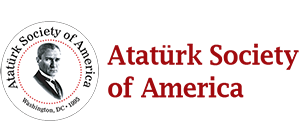I follow with bewilderment and great sorrow the internal developments in Turkey and the heated rhetoric which has ramifications for Turkey’s place in the world and relations with its historic allies.
This is not the Turkey that Atatürk envisioned. The course he set the new country on in 1923 when the Republic of Turkey was established was “Peace at Home, Peace in the World.”
The phrase “Peace at Home, Peace in the World” was repeated by Atatürk on various occasions. For example, in the message sent to President Franklin D. Roosevelt of the United States on the occasion of the Tenth Anniversary of the Turkish Republic, he wrote (October 29, 1933):
“The goal of peace at home, peace in the world, which is one of the basic principles of the Turkish Republic, should be the basic factor in the achievement of welfare and progress for humanity and civilization. We are proud to have worked towards this end, and to be doing so at present.”
Yet Turkey now finds itself in the middle of a maelstrom of domestic and international chaos exacerbated by anti-western rhetoric by Islamic based AK Party leaders.
Instead of continuing on Atatürk’s path of Westernization, science and modernity, the country’s leadership has chosen to turn back the clock, and follow the Ottoman model of a theocratic government bent on expanding its religious base.
Atatürk believed that Turkey must undergo Westernization to take its place in the civilized world. He wrote:
The downfall of the Ottoman Empire began on the day that it haughtily severed its ties with European nations because of its military victories against them. This was a mistake which we shall not repeat.
In keeping with our policies, our traditions, and our interests, we are inclined to the establishment of a European Turkey, or to be more precise, a Turkey inclined toward the West.
The current path Turkey is taking is not what Atatürk had in mind in 1923. By alienating the West and ignoring the progress made for over fifty years, Turkey’s leadership is doing a disservice to the Turkish people, who value education and progress. The progress made is being withered away for politicians’ self-interest and religious beliefs. Another development of increasing concern is the polarization in Turkish society which has led to violence and separatism. I am concerned that this may lead to civil war similar to what we saw in Balkans in the 1990s. The Prime Minister and President’s rhetoric, autocratic style, and failed policies have exacerbated frustration in the country manifested by attacks in both the countryside and the cities.
What is needed now is enlightened leadership, not heated rhetoric aimed at the Arab street. Turkey’s traditional allies are currently so entrenched in the global economic crisis, not much attention is paid to the Ergenekon and Balyoz operations, which have imprisoned under vindictive, trumped up charges without due process countless military leaders, intellectuals, journalists, secularists, and opposition secularist supporters, thereby frightening and silencing all critics of the current leadership. Some of these unfortunate persons have been in jail for three years without yet appearing before a judge. The illegal and pervasive use of wiretapping has led to paranoia and mutual distrust among the public.
During the last referendum which was championed by the government who touted the reforms such as expanding the rights of women and minorities to appeal to the Europeans, there were provisions to dilute the secular courts so that the fascist Prime Minister can expand his powers. The judiciary was the last remaining institution serving as a barrier to creeping islamization.
I need to remind readers that in the 1990s Turkey’s current Prime Minister, made statements (reported in international media including the Wall Street Journal) such as “Turkey should not become a Member the European Union,” “I oppose NATO,” “I support Koranic Law,” and “You can’t be both Muslim and secular.” These statements show Erdogan’s deceit in current dealings with Europe and the West, and should alarm leaders regarding his intentions.
No wonder there is increasing alarm that Turkey has lost its way. It is time to relearn the lessons of Atatürk, for the sake of our children and grandchildren.

